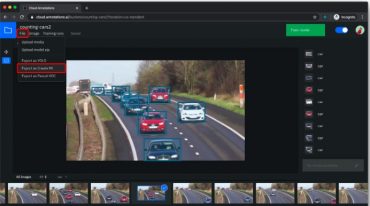
When every micro-second matters and minor decisions can change the entire course of the race, other companies will be watching and waiting to see how AI and advanced analytics can solve their own challenges.
The New York Yacht Club’s American Magic has some new technology help. Altair will become the official computational science and artificial intelligence partner for the team that will compete in the 37th America’s Cup in 2024. The envisioned analytics not only bring cutting-edge technology to sports performance but may also have far-reaching benefits for a variety of industries and applications.
Bringing advanced analytics and AI into yacht racing
Teams are looking to powerful analytics to improve choices because these races see boats and teams already operating at near-perfect levels. Analytics uncovers patterns and connections the human eye may not immediately notice, allowing teams to hone skills even further down the perfect edge.
Altair will bring its capabilities to the New York Yacht Club in two ways. The first work stream will leverage robust analytics to provide the American Magic team insights into past races. The team will break down events in past races to determine how to improve performance and avoid past pitfalls. The team will be able to analyze boat velocity compared to course conditions, as well as boat and sailor maneuvers. This analysis offers profound guidance into optimal race strategy.
The second work stream involves artificial intelligence. The team will use simulated races to play out different choices, conditions, and outcomes. Thanks to AI’s reinforcement learning, the team will decrease the need for physical testing and prototyping. The data from these simulations will contribute to the overall analysis of performances and allow teams to optimize future race strategies.
In a world where everything relies on data-driven decision-making, it’s no wonder sports teams are seeing the benefits of adding artificial intelligence and advanced analytics to their tool bag.
See also: How the Democratization of AI is Fueling Business Growth
What could this technology mean for the rest of the world?
Data analytics applied to yacht racing is more than just good news for the sports industry. It can be exciting for other sectors. Here are some of the most intriguing possibilities.
Applying cutting-edge technology to real-world use cases
Yacht racing is a highly competitive sport, and teams are always looking for ways to gain an advantage. Data analytics can provide insights that can help teams optimize their performance, and the technology used to collect and analyze data is cutting-edge. Any use case where these cutting—and even bleeding—edge technologies prove successful is a good testing ground.
Other industries that involve maneuvers in different environmental conditions could benefit. Additionally, elite yacht racing isn’t the only case of operating on a razor-thin margin. Simulating different decisions using advanced analytics from new technology tools could provide extra benefits in the supply chain world, for example.
Transferability of data
The same data analysis techniques used in yacht racing can be applied to other industries, such as manufacturing, transportation, and logistics. Here are some examples:
- Predictive maintenance: Yacht racing involves the use of sophisticated sensors that collect data on various components of the yacht. This data can predict when components will need maintenance or replacement. Other industries that use complex machinery could leverage the same techniques and sensor devices.
- Optimization of performance: The American Magic team will use data analytics to optimize the performance of the yacht by considering factors such as wind speed, direction, and current. Industries such as transportation and logistics can use the same methods to optimize routes and schedules.
- Risk management: Altair’s analytics tools will enable the American Magic team to identify and mitigate risks in yacht racing, such as collisions or capsizing. This same approach can be applied to other industries, such as insurance, where risk analysis forms the core business approach.
- Product design: Yacht designers use data analytics to optimize the yacht’s design for maximum speed and efficiency. Other industries, such as automotive or aerospace, can use the same methods to optimize the design of vehicles for maximum performance.
- Energy efficiency: Yacht racing teams use data analytics to optimize energy use—even how small changes like adjusting the sails to use the wind can change the entire outcome. This same approach can be applied to other industries, such as building design, to optimize energy usage and reduce waste.
Providing a roadmap for interdepartmental collaboration
Data analytics in yacht racing often involves collaboration between engineers, designers, and sailors. This collaborative approach could be applied to other industries where interdisciplinary collaboration is essential.
In addition, yacht racing teams use data analytics to provide real-time feedback to sailors, allowing them to adjust their tactics and maneuvers based on current conditions. This same approach can be applied to other industries, where real-time feedback can help teams adjust their strategies and make informed decisions. It offers other industries a roadmap to continuously improve performance based on data analysis and incremental changes.
New innovation tools and strategies
The use of data analytics in yacht racing encourages innovation and experimentation, which can lead to new and novel solutions to problems. Yacht racing teams are composed of individuals with diverse knowledge backgrounds, such as sailors, engineers, and designers. This cross-disciplinary approach encourages collaboration and the exchange of ideas, leading to innovative solutions.
Many companies are shifting to a more agile approach to business operations. This requires a commitment to continual testing and assessments, shortening the time between iterations. The analytics here could offer companies examples of how to apply these approaches to their own operations. They’re also adopting their own artificial intelligence tools and strategies to compete efficiently and drive digital transformation.
Yacht racing analytics could be a microcosm of what is possible
As we watch the American Magic team leverage Altair’s capabilities for their next potential win, we’re also watching just how widely applicable these technologies are. When every micro-second matters and minor decisions can change the entire course of the race, other companies will be watching and waiting to see how AI and advanced analytics can solve their own challenges.




























